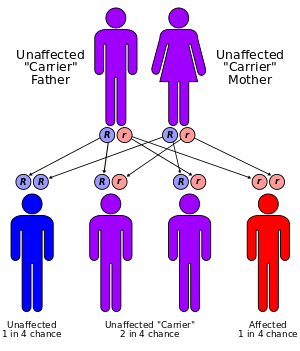Craniodiaphyseal dysplasia
| Craniodiaphyseal dysplasia | |
|---|---|
| Classification and external resources | |
| OMIM | 218300 |
Craniodiaphyseal dysplasia (also known as CDD or lionitis) is an extremely rare autosomal recessive bone disorder that causes calcium to build up in the skull, disfiguring the facial features and reducing life expectancy.
These calcium deposits decrease the size of cranial foramina, and can also decrease the hole in the cervical spinal canal. In the few cases recorded, most of the sufferers died in childhood.
The underlying genetics are uncertain.[1]
Diagnosis
Among the medical signs are dacryocystitis, seizures, intellectual disability, and paralysis, each of which is a complication resulting from the diminutive foramina. A common sign reported as a result of the disease has been a difference of the size of the eyes.

Depiction
Peter Bogdanovich's 1985 drama film Mask drew public attention to the case of Roy L. "Rocky" Dennis, an American boy who died of the disorder in 1978.
In the American medical drama Grey's Anatomy episode "Yesterday", a teenage boy is depicted with lionitis.
The main character of the two-issue comic book miniseries Friday the 13th: How I Spent My Summer Vacation by Wildstorm is a 13-year-old boy suffering from the disorder (with its effects and name being stated).
In "American horror story" by [ Ryan Murphy] season 1 (fan dubbed Murder house) Beauregard the brother of Tate and Adelaide suffered of lionitis
References
- ↑ Brueton LA, Winter RM (November 1990). "Craniodiaphyseal dysplasia". J. Med. Genet. 27 (11): 701–6. doi:10.1136/jmg.27.11.701. PMC 1017262
 . PMID 2277386.
. PMID 2277386.